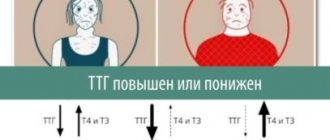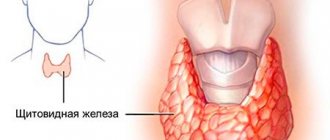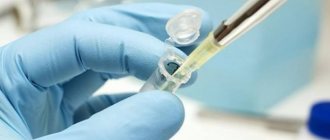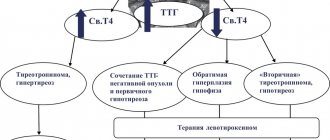Hormonal disorders of the thyroid gland are a sign of the development of serious pathologies in the body. According to statistics, such disruptions in the endocrine system occupy second place in the world after diabetes mellitus. Therefore, it is important to regularly visit an endocrinologist to monitor hormone levels and timely diagnosis of thyroid pathologies.
COST OF SOME ENDOCRINOLOGIST SERVICES IN OUR CLINIC IN ST. PETERSBURG
| Price for a detailed examination of thyroid hormones (8 tests) | 5020 rub. |
| Endocrinologist appointment | 1000 rub. |
| Ultrasound of the thyroid gland | 1000 rub. |
| Call free: 8-800-707-1560 *The clinic is licensed to provide these services | |
What hormones does the thyroid gland produce and why are they needed?
The content of the article
The thyroid gland is one of the most important organs of the endocrine system. This butterfly-shaped gland is located on the front of the neck, just below Adam's apple. It has two petals connected by a thin isthmus and, in response to the pituitary thyroid-stimulating hormone, produce their own hormones that perform the regulatory and coordinating function of human organs.
Thyroid hormones, called iodine-containing peptides, are triiodothyronine (T3) and thyroxine (T4). These hormones play an important role in human life and have a decisive influence on metabolism (metabolism), growth and development of the body of any person.
T3 and T4 are produced by the follicular cells of the thyroid gland in response to the pituitary hormone TSH. Their production requires two main components - iodine and the amino acid tyrosine, which usually enter the body with food and water, so it is important that they are present in sufficient quantities in the diet.
When synthesizing hormones, the thyroid cell (thyrocyte) produces a glycoprotein substance (thyroglobulin), which accumulates in the cavity of the thyroid follicle and serves as a kind of “reserve” for the rapid synthesis of hormones.
In addition to the hormones T3 and T4, the thyroid gland produces, along with C cells, another hormone known as calcitonin, which is involved in the regulation of calcium and phosphorus metabolism and bone development.
- The production of thyroid hormones is regulated by a mechanism that reduces the rate of production when circulating hormone concentrations are high, and increases it when the concentration of hormones in the blood decreases.
- Regulation is carried out by the hypothalamic-pituitary system through a negative feedback mechanism.
The pituitary gland synthesizes thyroid-stimulating hormone, which enhances the synthesis and release of T3 and T4 into the blood. The secretion of TSH, in turn, is regulated by the function of the hypothalamus, which produces thyrotropin-releasing hormone. In this way, a hormonal balance is maintained that is adequate to the body's needs.
Our phone numbers:
Thyroid
Structure, functions and significance of the thyroid gland
The thyroid gland (glandula thyroidea) is an endocrine gland, part of the endocrine system, which synthesizes a number of hormones necessary to maintain homeostasis in the body.
The thyroid gland (colloquially “thyroid gland”) is a symmetrical organ, consisting of two lobes and an isthmus. The right and left lobes are adjacent directly to the trachea, the isthmus is located on the anterior surface of the trachea. Some authors separately identify the pyramidal lobe in the thyroid gland. In a normal (euthyroid) state, the mass of the thyroid gland ranges from 20 to 65 g, and the size of the lobes depends on gender and age characteristics and can vary within a fairly wide range. During puberty, the size of the thyroid gland mass increases, and in old age, accordingly, it decreases. During pregnancy, women also experience a temporary increase in the size of the thyroid gland, which goes away on its own, without treatment, within 6-12 months after birth.
The thyroid gland synthesizes two iodine-containing hormones - thyroxine (T4) and triiodothyronine (T3), and one peptide hormone - calcitonin. In the tissue of the thyroid gland, the amino acid tyrosine accumulates, which is deposited and stored in the form of a protein - thyroglobulin (a building material for the synthesis of thyroid hormones). In the presence of molecular iodine and the activation of the enzyme thyroid peroxidase (TPO), the hormones T3 and T4 are synthesized. Thyroxine (T4) and triiodothyronine (T3) are synthesized in the apical part of the thyroid epithelium. Calcitonin (thyrocalcitonin) is produced by the parathyroid glands, as well as the C-cells of the thyroid gland.
Biosynthesis of thyroid hormones.
Thyroid hormones are the main regulators of homeostasis in the human body. With their direct participation, the main metabolic processes occur in tissues and organs; formation of new cells and their structural differentiation takes place, as well as genetically programmed death of old cells (apoptosis). Another equally important function of thyroid hormones in the body is to maintain a constant body temperature and produce energy (the so-called calorigenic effect). Thyroid hormones regulate tissue oxygen consumption, oxidation and energy production processes in the body, and also control the formation and neutralization of free radicals. Throughout life, thyroid-stimulating hormones influence the mental, mental and physical development of the body. Hormone deficiency at an early age leads to growth retardation and can cause bone tissue diseases, and their deficiency during pregnancy significantly increases the risk of cretinism in the unborn child due to underdevelopment of the brain during the prenatal period. Thyroid hormones are also responsible for the normal functioning of the immune system - they stimulate the cells of the immune system, the so-called. T cells, which the body uses to fight infection.
Prevalence of thyroid diseases
According to the World Health Organization (WHO), among endocrine disorders, thyroid diseases occupy second place after diabetes mellitus. More than 665 million people in the world have endemic goiter or suffer from other thyroid pathologies; 1.5 billion people are at risk of developing iodine deficiency diseases. Moreover, according to statistics, the increase in the number of thyroid diseases in the world is 5% per year.
Among the possible causes of the development of thyroid pathologies, one can primarily highlight a poor environmental situation, a lack of iodine and other nutrients in the diet, as well as increasingly common genetic disorders.
Diagnosis of thyroid diseases
To select the correct treatment, diagnosis of patients with thyroid diseases should include physical, instrumental and laboratory methods for assessing its morphological structure and functional activity. For example, by palpation (tactile palpation with fingers) of the thyroid gland, you can determine its size, the consistency of the thyroid tissue and the presence or absence of nodules. Today, the most informative laboratory method for determining the concentration of thyroid hormones in the blood is an enzyme-linked immunosorbent assay, carried out using standard test kits.
Ultrasound examination (ultrasound) of the thyroid gland.
Modern methods for assessing the structure of the thyroid gland also include ultrasound diagnostics (US), computed tomography (MRI), thermography and scintigraphy. These methods make it possible to obtain information about the size of the organ and the nature of accumulation of the radiocontrast agent in different parts of the gland. Using a fine-needle aspiration biopsy (FNA), thyroid cells are collected for analysis and then studied.
It should be noted that with all the variety of methods for laboratory monitoring of the thyroid gland, the fastest diagnostic methods are tests to determine the content of free/bound forms of hormones T3 and T4, antibodies to thyroglobulin (AT-TG) and to thyroid peroxidase (AT-TPO), and also the level of thyroid-stimulating hormone (TSH) in the blood plasma. In addition, sometimes a type of analysis is performed to determine iodine excretion in urine. This study allows us to determine whether there is a connection between thyroid disease and iodine deficiency.
Symptoms of thyroid diseases
Hypothyroidism (underfunction) is a condition characterized by decreased levels of thyroid hormones, occurring in 19 out of 1000 women and 1 out of 1000 men. Often hypothyroidism is not detected for a long time, because Symptoms of the disease develop very slowly and patients do not complain about their health status. In addition, the symptoms of hypothyroidism can be nonspecific, and the disease can occur hidden behind the “masks” of a number of other diseases, which in turn leads to erroneous diagnosis and incorrect treatment.
With a chronic lack of thyroid hormones in the human body, all metabolic processes slow down, as a result of which the production of energy and heat decreases. Clinical symptoms of hypothyroidism development are:
- fatigue;
- weakness;
- decreased performance;
- memory impairment;
- chilliness;
- swelling;
- rapid weight gain;
- dry skin;
- dullness and brittleness of hair.
In women, hypothyroidism can cause menstrual irregularities and cause early menopause. One of the common symptoms of hypothyroidism is depression, for which patients are referred to a psychologist or psychiatrist.
Thyrotoxicosis (hyperfunction) is a clinical condition characterized by a persistent increase in the level of thyroid hormones in the blood, which leads to an acceleration of all metabolic processes in the body. Classic symptoms of tereotoxicosis are:
- irritability and short temper;
- weight loss (with increased appetite);
- rapid heartbeat (sometimes with rhythm disturbance);
- sleep disturbance;
- constant sweating;
- elevated body temperature.
Sometimes, and especially in old age, these symptoms do not appear clearly and patients associate their condition not with any disease, but with natural age-related changes in the body. For example, a feeling of heat, “hot flashes”, which are classic signs of thyrotoxicosis, can be regarded by women as manifestations of menopause.
A fairly common symptom in patients with thyroid diseases is goiter (formation of the so-called goiter) - an enlargement of the organ beyond the permissible values (the normal volume of the gland in men is 9-25 ml, in women - 9-18 ml). In the euthyroid state, the thyroid gland slightly enlarges during adolescence, also in women during pregnancy and after menopause. Depending on whether the entire organ is enlarged or only a separate part of it is enlarged, it is customary to distinguish between diffuse or nodular goiter, respectively.
Causes of development of thyroid diseases
Undoubtedly, genetic factors play an important role in the occurrence of thyroid diseases, which determine a person’s predisposition to a particular disease. But, in addition, the role of various external stress factors in the development of thyroid pathologies is undeniable:
- psycho-emotional overload;
- unbalanced diet and, as a result, a lack of vitamins and/or microelements (including iodine deficiency);
- unfavorable environmental and radiation conditions;
- infections;
- chronic diseases;
- taking certain medications, etc.
These factors are the trigger for the occurrence of thyroid diseases.
Simply put, the human body is constantly affected by certain reasons that force its thyroid gland to produce an increased or decreased amount of hormones. This leads to the fact that this organ of the endocrine system “wears out” and “fades away”, and becomes unable to synthesize the optimal amount of hormones T3 and T4 for the body’s needs. Ultimately, either chronic functional disorders of the thyroid gland develop (hypo-, hyperthyroidism), or morphological changes in its structure (formation of goiter, formation of nodules, hyperplasia, etc.).
Existing drugs and methods of treating thyroid diseases
Hormonal disorders of the thyroid gland, manifested as hyper- or hypothyroidism, are usually treated with chemotherapy drugs. The standard of treatment is the use of thyroid hormone preparations, including medications such as triiodothyronine, thyroxine, as well as their combinations and complexes with inorganic iodine (iodothyrox, thyrotom, thyrocomb).
These medications compensate for the deficiency of your own thyroid hormones and are usually used for life. This method of treating the thyroid gland is called hormone replacement therapy (HRT). Its main disadvantage is the suppression of the thyroid gland's synthesis of its own thyroid hormones, as a result of which the patient becomes dependent on hormone replacement therapy and can no longer live without pills. Other side effects of HRT include allergic reactions to synthetic hormones, heart rhythm disturbances, nervous disorders, etc.
Dentist Dimanova S.V.
The importance of thyroid hormones
Thyroid hormones play a fundamental role in the proper functioning of metabolism, growth and development:
- Metabolism.
Thyroid hormones increase both basal metabolism and metabolic activity of all tissues. Basal metabolism refers to the energy expenditure of a person at rest and wakefulness. For example, a person with elevated thyroid hormone levels will have increased energy intake. Thyroid hormones also affect glucose and lipid metabolism, increase protein synthesis, increase cardiac contractility, and increase heart rate. Thus, with hyperthyroidism, one of the main symptoms is tachycardia. - Height
. Thyroid hormones are essential for normal human growth, as evidenced by slow growth in cases of hormone deficiency. - Development.
A classic experiment in endocrinology was the demonstration that tadpoles deprived of thyroid hormones could not be transformed into frogs. This reinforces the fact that normal hormone levels play a fundamental role in fetal and newborn brain development.
Treatment of thyroid diseases
Treatment varies depending on whether you have symptoms of an overactive or underactive thyroid.
In case of hyperthyroidism
Treatment begins with antithyroid therapy until hormone levels return to a constant normal level. Sometimes it is necessary to remove the thyroid gland in one of two ways:
- radioactive iodine, which destroys its tissues;
- thyroidectomy – surgical removal of part or all of the thyroid gland.
Then it is necessary to carry out hormone replacement therapy, since the body is in a state of hypothyroidism.
As noted, hypothyroidism is treated with ongoing hormone replacement therapy in the form of a synthetic form of the T4 hormone.
At the beginning of treatment, it is necessary to be patient until everything stabilizes, although the administration of the drug can dramatically improve the patient's life, especially sexual discomfort.
Additional influence of hormones
Thyroid hormones have a profound effect on almost the entire body:
central nervous system
. A sufficient level of thyroid hormones in the last phase of development of the fetus and newborn is an important condition for the normal development of the central nervous system. Hormonal imbalance of the thyroid gland during this delicate period leads to cretinism or irreversible mental retardation. Early diagnosis and adequate replacement therapy in the third week of life can prevent serious and undeniable consequences.
In an adult, both a decrease and an increase in the concentration of thyroid hormones lead to changes in mental state. A decrease in thyroid hormone levels causes a person to feel lethargic, while an excess of hormones provokes anxiety and nervousness.
Sympathetic nervous system
. Thyroid hormones increase the number of specific receptors with which catecholamines (chemicals such as adrenaline that transmit nerve impulses at the level of sympathetic nerve endings) interact. It occurs mainly in the heart, skeletal muscle, adipose tissue and lymphocytes.
The cardiovascular system
. Thyroid hormones increase myocardial contractility, heart rate, and venous return to the heart, significantly improving cardiac function. They also promote vasodilation, which leads to increased blood flow to many organs.
Respiratory system
. Thyroid hormones influence the response of nerve centers to respiratory stimuli. In practice, they perform an irreplaceable function - an effective response of the lungs (variation of the frequency and amplitude of respiratory movements) to various factors (for example, oxygen deficiency). This also explains the hyperventilation and functional impairment of the respiratory muscles that occurs with hypothyroidism.
Skeletal apparatus
. The thyroid gland is fundamental to skeletal development and formation: insufficient production of thyroid hormones during fetal development and childhood causes stunted bone growth, which can lead to dwarfism. Hormone replacement therapy will ensure normal skeletal development, but only if the problem is diagnosed and treated before puberty.
Digestive system.
The movement of the smooth muscles of the stomach and intestines is facilitated by thyroid hormones, so in conditions of hyperthyroidism diarrhea is observed, and in situations of hormonal deficiency (hypothyroidism) constipation can occur. In the latter case, the activity of the digestive system as a whole decreases, and the metabolism slows down with subsequent weight gain.
Reproductive system
. Excess or deficiency of thyroid hormones can cause infertility and reproductive problems, especially in women. In women suffering from hypothyroidism, there is an increase in the production of prolactin (a hormone secreted by the pituitary gland). This can cause menstrual irregularities or even amenorrhea (complete absence of periods). In men, thyroid dysfunction can cause erection problems and, in extremely rare cases, infertility.
Apparatus for hematopoiesis.
Thyroid hormones influence the production of red blood cells (erythropoiesis), which originate in the bone marrow. In the case of hypothyroidism, anemia often occurs, while in the presence of increased hormonal activity, the production of red blood cells is stimulated due to increased oxygen demand in the tissues.
Hormonal imbalances
There are several diseases associated with the level of thyroid hormones:
- hyperthyroidism – increased levels of hormones. They affect biochemical processes in the body;
- Hypothyroidism is a condition caused by an underactive thyroid gland. The gland is unable to synthesize the amount of hormones T3 and T4 adequate to the needs of the body, and this determines a decrease in all metabolic processes;
- a disease associated with anatomical changes in the thyroid gland, in which the level of hormones is normal.
Tests for T4
The total T4 test measures bound and free thyroxine (T4) in the blood plasma.
Free T4 is not bound to protein molecules; it can freely penetrate and act on body tissues. It is important to know that the overall T4 level is affected by medications and various pathological conditions. Estrogen, oral contraceptive pills, pregnancy, liver disease, or a viral infection (such as hepatitis C) are some common causes of increased thyroid hormone binding proteins, leading to high total T4 levels. Testosterone, androgens, and anabolic steroids are common causes of decreased thyroid hormone binding proteins, leading to decreased total T4. Sometimes, such as in pregnant women, there may be normal thyroid function, but the total T4 level is outside the normal range. Blood tests that measure the free T4 index can more accurately reflect how the thyroid gland is functioning under these circumstances.
Hypothyroidism
Deficiency of thyroid hormones causes the following symptoms, which are the reason for an urgent visit to an endocrinologist:
- Depression and fatigue, especially when waking up and resting, loss of memory, concentration and learning ability, drowsiness, apathy, disinterest, decreased speed of thought and speech, alternating with nervousness and hyperactivity;
- Dry and pale skin, hair loss and dryness, thinning of the outer eyebrows, brittle nails with grooves, constipation, poor digestion, low body temperature, poor sweating in the heat;
- High risk of infection, weakened immune defense and predisposition to cancer;
- Decreased insulin sensitivity, metabolic syndrome, slow heartbeat, increased cholesterol and diastolic pressure, atherosclerosis, increased risk of death from heart disease (heart failure, coronary artery disease, arrhythmias);
- Night muscle cramps, myalgia, pain and stiffness (especially in the morning), headache, menstrual irregularities, uterine bleeding, infertility, tendency to terminate pregnancy, decreased tendon reflexes, enlarged thyroid gland (endemic goiter).
Reduced thyroid function will have consequences in many other hormonal areas. In particular, hypothyroidism creates a stressful situation that stimulates the adrenal glands, contributing to its development towards decompensation. “Adrenal fatigue” and hypothyroidism are often related (in 80% of cases) and aggravate each other.
The most common causes of hypothyroidism are autoimmune diseases (Hashimoto's thyroiditis), iodine deficiency, and problems with the hypothalamus and pituitary gland (the rarest hypothesis).
Hypothyroidism is an irreversible pathology. This means that the thyroid gland cannot resume its regular functioning. For this reason, the therapy taken is defined as “replacement”, in the sense that it is intended to replace hormones that the thyroid gland can no longer produce.
Hyperthyroidism
An overactive thyroid gland causes predominantly opposite symptoms:
- endemic goiter - the thyroid gland has increased in size;
- hair began to fall out rapidly and nails began to break;
- bulging eyes appeared;
- sudden outbursts of aggression, nervousness, anxiety;
- irritability gives way to tearfulness;
- tremors in the hands;
- increased sweating;
- rapid weight loss;
- causeless fatigue and weakness, insomnia;
- increased body temperature (at low temperatures a person is not cold);
- increased heart rate (tachycardia);
- suffers from diarrhea;
- dystrophic changes in the liver (with a long course of the disease);
- in severe cases, women experience uterine bleeding, and men experience changes in the testicles and prostate gland, decreased libido.
One of the most common causes of the disease is Graves' disease, an autoimmune disease that causes the body to produce autoantibodies that activate the secretion of thyroid hormones. Also, overactivity of the gland can be caused by Hashimoto's thyroiditis, toxic, taking certain medications or supplements with a high iodine content, etc.
Hyperthyroidism can usually be diagnosed and treated in a clinic without the need for hospitalization. Various types of treatment are possible: pharmacological, surgical, with radioactive iodine and, in the case of toxic adenoma, by alcoholization. The doctor prescribes the most appropriate therapy depending on the specific pathology.
Thyroid diseases in men - causes
The content of the article
Thyroid diseases cause:
- Hashimoto's disease as the most common autoimmune cause of hypothyroidism (decreased thyroid function);
- Graves' disease as the most common autoimmune cause of hyperthyroidism (increased thyroid function);
- lithium, amiodarone, interferons can cause hypothyroidism;
- hyperactive nodules in the thyroid gland as a cause of hyperthyroidism;
- thyroid cancer;
- Pituitary adenoma is a benign tumor in the pituitary gland of the brain, which regulates the secretion of thyroid hormones;
- selenium deficiency in the body;
- low testosterone as a trigger, but also as a consequence of thyroid disease.
Hormone analysis
A blood test for thyroid hormones is necessary if the above symptoms are present. Blood is taken from the ulnar vein on an empty stomach in the morning. Before this, you need to be at rest for half an hour.
Preparation for analysis implies compliance with the following rules:
- stop smoking, drinking alcohol and psychostimulants (caffeine) one day before;
- for 2-3 days, exclude fried, hot, spicy and other heavy foods from the diet;
- avoid physical and emotional stress for 12 hours;
- stop taking medications that affect the level of thyroid hormones one month before;
- 3-4 days in advance, exclude iodine-containing foods (seaweed, fish, iodized salt) from the diet.
A complete and detailed biochemical study includes assessment of the following indicators:
| Index | Norm |
| Thyroid-stimulating hormone (TSH) | 0.4 – 4.0 mU/l |
| Triiodothyronine T3 free | 2.6 – 5.7 pmol/l |
| T3 general | 1.3 – 2.7 nmol/l |
| Thyroxine T4 free | 9.0 – 22.0 pmol/l |
| T4 general | 58 – 161 nmol/l |
| Antibodies to thyroglobulin (AT-TG) | 0 – 18 U/l |
| Antibodies to thyroid peroxidase (AT-TPO) | No more than 5.6 U/l |
| Calcitonin | In men: 0 – 2.46 pmol/l. In women: 0 – 1.46 pmol/l. |
The normal level of hormones is largely determined by the intensity of physical activity, emotional state and time of year. For certain categories of people, hormone levels may also differ.
These include:
- people over 50 years old;
- teenagers;
- children under 12 years of age;
- children of “turning-point” age;
- pregnant women.
The doctor may prescribe the determination of only some of these indicators. So, to treat the thyroid gland, it is enough to determine only two indicators - free T4 and TSH. During pregnancy, 4 indicators are determined - TSH, free T3, free T4 and AT-TPO. Due to the laboriousness and high cost of the procedure for determining each indicator, it is recommended to study only those indicators, changes in which may be the cause of the corresponding symptoms.
TSH test
The best way to initially test your thyroid activity is to measure your TSH level.
Changes in TSH can serve as a kind of early monitoring system. It often changes in advance, even before the actual level of thyroid hormones reaches low or too high levels. High TSH is an indicator that the thyroid gland does not secrete enough T3 together with T4, which is possible with primary hypothyroidism. If TSH is low, this may indicate that the thyroid gland is too active and produces excess hormones, which is typical for hyperthyroidism.
Sometimes low TSH results from an abnormality in the pituitary gland that prevents it from producing enough hormone to stimulate the thyroid gland (central hypothyroidism).
What does a change in hormone levels indicate?
Based on the results of the analysis, the endocrinologist determines the diagnosis or condition of the body.
| Violation | T3, T4 | TSH |
| Primary hypothyroidism | Decreased or normal | High |
| Secondary hypothyroidism | Short | High |
| Hyperthyroidism | Elevated | Reduced |
| Both dysfunctions can be a sign of certain malfunctions in the body. For example, an increased level of thyroxine is observed with obesity and diffuse goiter, and a decreased level is observed with fasting, during pregnancy and taking certain medications. | ||
| Hormone | Promotion | Demotion |
| TSH | hypothyroidism; adrenal insufficiency; psycho-emotional arousal; tumor; severe non-thyroid pathology; a consequence of taking morphine and other drugs. | primary hyperthyroidism; thyrotoxicosis |
| T4 free | hyperthyroidism; obesity; somatic and mental disorders; dysfunction of the adrenal glands. | III trimester of pregnancy; hypothyroidism; starvation; high physical activity. |
| T4 general | obesity; acute form of hepatitis; inactive phase of HIV; porphyria; hyperbilirubinemia; during pregnancy. | starvation; kidney diseases; gastrointestinal diseases; many somatic pathologies. |
| T3 general | excessive thyroid function; hepatitis; pregnancy; AIDS; porphyria. | hypothyroidism; starvation; hemolysis; diseases of the gastrointestinal tract, kidneys and liver. |
Additional indicators:
- TG. An increased level of the hormone is a sign of non-toxic, endemic, multinodular or diffuse goiter, thyroid cancer, thyroiditis;
- AT-TPO. Exceeding the norm indicates the development of a malignant tumor;
- Calcitonin. It is one of the basic tumor markers and indicates the presence of a malignant process.
- AT-TG. An excess of the normal value may indicate Graves' disease, thyroiditis, idiopathic myxedema, pernicious anemia, thyroid carcinoma (cancer) or other autoimmune and chromosomal pathologies.
Tests for T3
The T3 test measures the level of triiodothyronine (T3) in the blood.
The total T3 test shows the bound and free fractions of triiodothyronine. Patients with hyperthyroidism typically have elevated total T3 levels. T3 tests can be used to confirm the diagnosis of hyperthyroidism and determine its severity. In some thyroid diseases, the T3:T4 proportions are altered and can provide diagnostic information. A significant increase in T3 relative to T4 is characteristic of Graves' disease. Medicines such as steroids and amiodarone, as well as severe illness, can reduce the amount of the hormone that the body converts from T4 to T3 (the active form), leading to a lower percentage of T3.
T3 levels decrease later than others in hypothyroidism, and therefore are not usually used in diagnosing patient problems.
Prevention
In order to prevent thyroid diseases associated with hormonal imbalance, or eliminate minor disruptions, it is necessary to ensure that the body receives a sufficient amount of tyrosine and iodine from food.
The main iodine-containing products are sunflower oil, iodized salt, kelp seaweed, crabs, fish (oceanic), shrimp, squid, etc. Tyrosine is found in eggs, milk, peanuts, peas, and beans. Maintaining hormonal balance is the key to a healthy thyroid gland. And all you need for this is a complete and balanced diet. Also, do not forget about regular visits to the endocrinologist. Checking once every 3 months is sufficient.
If you find an error, please select a piece of text and press Ctrl+Enter
Symptoms of thyroid disease in men
Symptoms of hyperthyroidism:
- weight loss;
- anxiety;
- bulging eyes,
- tremor;
- irritability;
- diarrhea;
- hair loss;
- frequent mood swings;
- gynecomastia (breast enlargement).
The clinical picture of hypothyroidism looks somewhat different:
- slow metabolism (metabolism);
- weight gain;
- feeling cold;
- forgetfulness;
- depression;
- fatigue;
- dry skin;
- constipation;
- loss of will;
- hair loss, slow beard growth;
- joint and muscle pain;
- decreased sex drive;
- infertility;
- low testosterone levels;
- erectile disfunction;
- delayed ejaculation.
The last few of these symptoms are specific to men. Therefore, thyroid disease should not be neglected in case of sexual problems or infertility.









